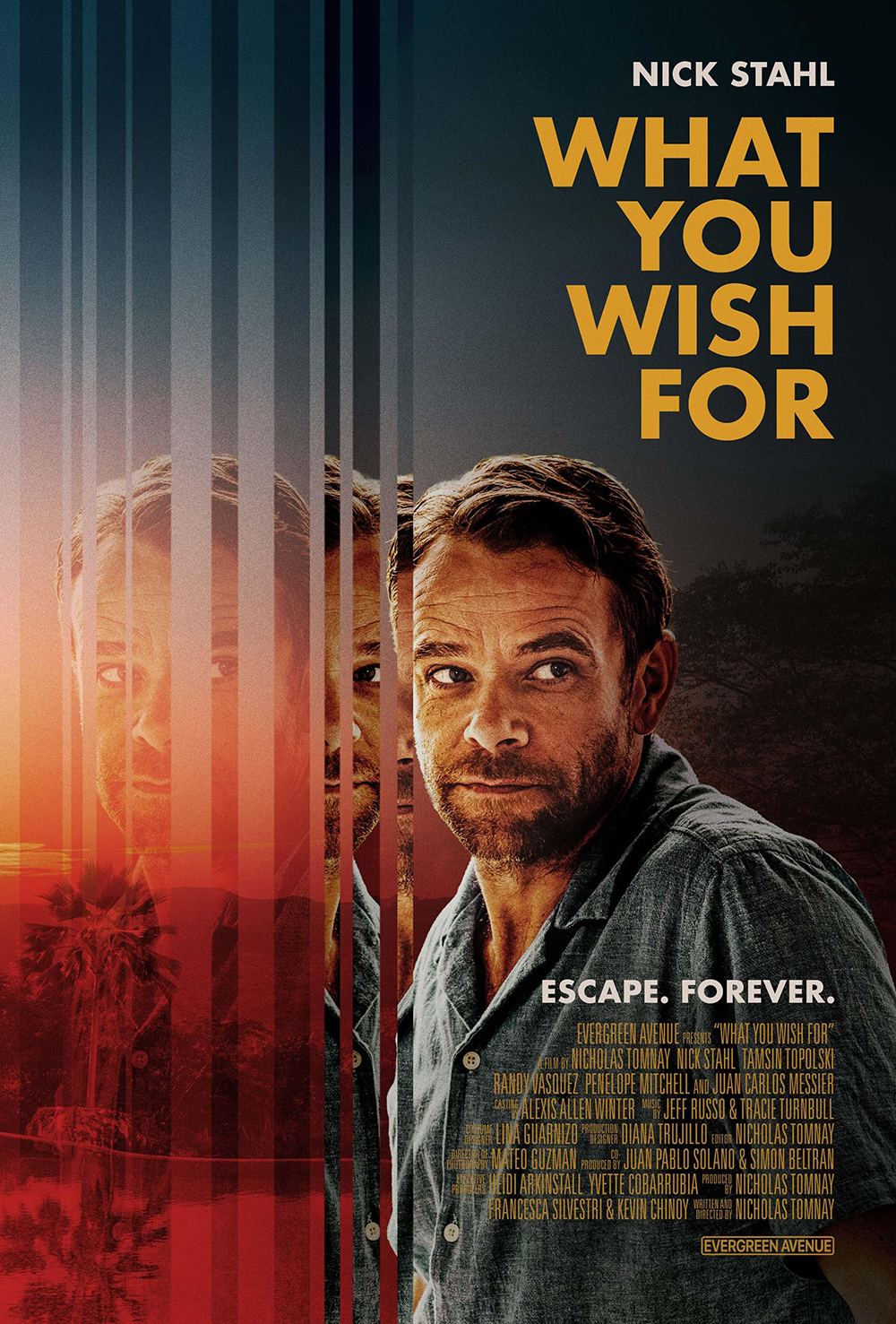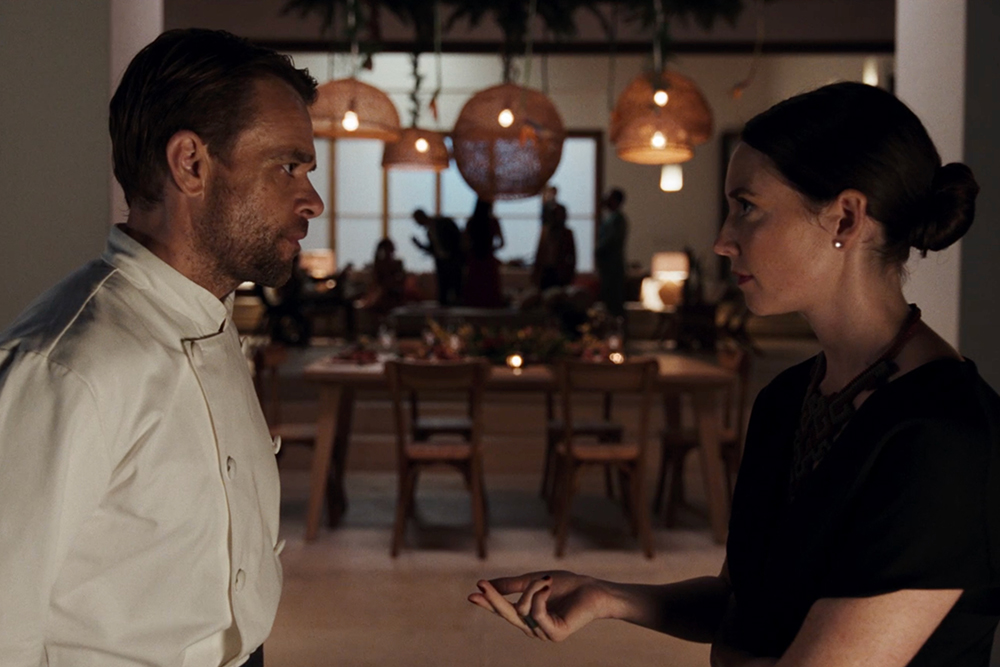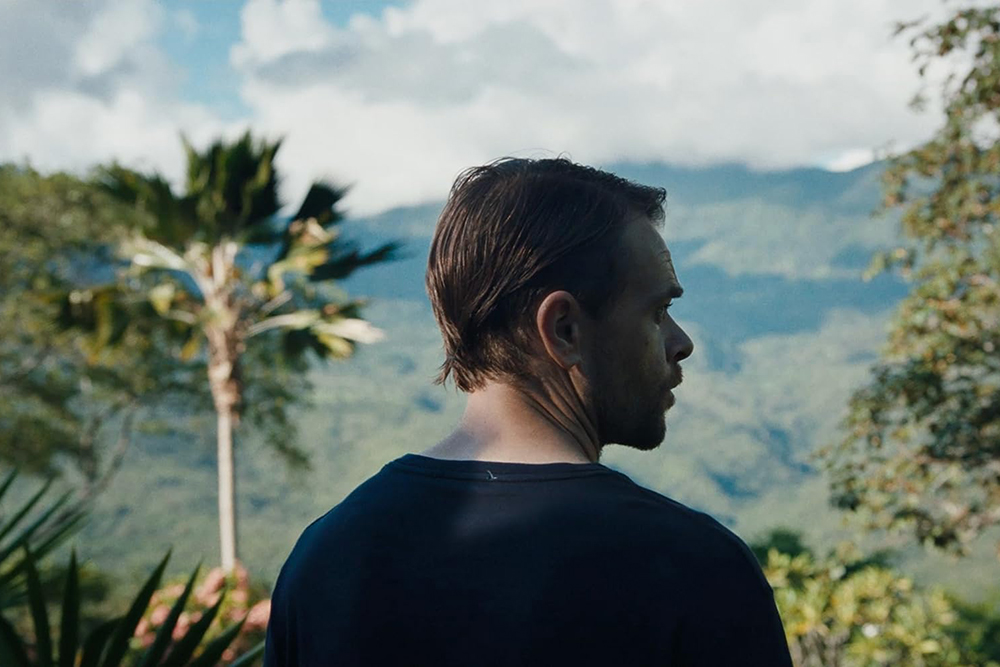Interview - What you wish for : Let’s talk with the director Nicholas Tomnay
By Mulder, Etats-Unis, 14 september 2023

Director Nicholas Tomnay's latest film, What You Wish For, starring Nick Stahl, takes viewers on a thrilling journey through the contrasting worlds of aspiration, envy, and morality against the backdrop of Latin America. The film centers on Ryan Mosely, portrayed impeccably by Nick Stahl, a gambling addict fleeing debt and danger who seeks refuge with his successful culinary school roommate, Jack (Brian Groh). This edgy thriller seamlessly blends the culinary arts with a gripping narrative, making food a central theme throughout. As Ryan steps into Jack's seemingly perfect life, the film challenges the notion that the grass is always greener on the other side. It explores empathy and understanding while navigating the complexities of aspiration and ambition. At its core, the film serves as a compelling examination of human desires, societal divides, and moral dilemmas, leaving audiences pondering the true price of their wishes. What You Wish For is a thrilling cinematic experience that will leave viewers reflecting on their own aspirations and choices.
We have the opportunities to talk with the director Nicholas Tomnay
Q: What inspired you to create "What You Wish For," and how did the project come to life ?
Nicholas Tomnay: It was a combination of a few things. I'm a big fan of suspense movies, and when I wrote the script, I was in my mid-40s and thinking about the idea of being in my mid-40s. It's about letting go of potential and confronting who you really are. Also, I'm a big fan of Patricia Highsmith. The third element was my response to the greed in the world, where profit is more important than anything else.
Q: The film explores the concept of stepping into someone else's shoes. Can you delve into how you approached depicting this idea and its significance in the story ?
Nicholas Tomnay: Well, I've always liked the idea of a character on the run or wanting to adopt another identity, only to discover that it's worse than their own. It's a matter of figuring out what they're running from, which translated into this dinner concept. The challenge was to make this dinner situation worse than his own life.
Q: Could you share some insights into the character development process, especially for the central character, Ryan Mosely ?
Nicholas Tomnay: I wanted to make the film in a subjective way so that you see the story from the main character's perspective throughout. That's why the opening sequence is structured as it is. As he arrives, we're meant to understand information just as he does. For the first 15 minutes, you experience the world as he does and gain insight into what he's running from through bits of backstory. This is the initial focus of the film. My hope was that, as he arrives at the house and meets Jack, the audience would share in the character's perspective. The house is depicted as beautiful and seductive, with the film's aesthetics conveying a sense of slickness and aspiration. We want the audience to feel the allure of this environment, to desire it, and to imagine living in such an appealing space. However, as the story unfolds, this initial attraction takes a darker turn. New information is revealed to both the character and the audience, not so much through twists and turns, but through gradual narrative reveals. These revelations shed light on elements that were always present but hidden from view.
Q: The film touches on the consequences of unchecked ambition. What drew you to this theme, and how do you believe it resonates with audiences ?
Nicholas Tomnay: We're often taught, to some extent, that more is better, and that we may not be good enough as we are. We tend to believe that if we could achieve certain goals, we would finally find happiness. Success is often measured in material terms, and we often overlook the value of simply being content with ourselves. Spiritual success is sometimes undervalued compared to material success. This is a struggle many of us face on some level. There's an important element of learning to appreciate and be grateful for the blessings we already have. Finding contentment in what we possess tends to bring more happiness than constantly longing for things we lack, which can lead to feelings of unhappiness.
Q: What challenges did you face while incorporating culinary aspects into the film, and how did you overcome them ?
Nicholas Tomnay: We had a food stylist involved in the film, and she prepared some dishes for us before we started shooting. My priority was to make the food look wonderful and visually appealing. However, given that this was a low-budget film, we had financial constraints and couldn't allocate unlimited funds to create the dishes. Our approach was a blend of skillful food styling and how the characters reacted to the food. While it was essential for the casino's food to look great, the primary emphasis was on how it tasted. In the film, you'll notice characters who genuinely appreciate the taste of the food. For instance, there's a scene where Ruiz is savoring a bowl of soup at the beginning, displaying his delight. This scene not only adds a twisted, dark sense of humor but also conveys to the audience that the food indeed tastes fantastic.
Q: Can you elaborate on the significance of the Latin American backdrop and how it enhances the overall narrative ?
Nicholas Tomnay: I wanted to set the film in Latin America because I believe it offers a unique combination of factors. Latin America comprises areas that are still developing, with certain regions characterized by third-world elements. Simultaneously, it features incredible, almost palatial, villages and stunning natural beauty. In some areas, there's a significant population living in poverty. This made Latin America a fitting choice when considering the themes of imperialism and the interest of wealthy Western individuals. Such regions are often attractive to those seeking to exploit vulnerable populations, and their inherent beauty adds to the allure. Therefore, our primary reason for selecting Latin America as the setting was to reflect these dynamics and contrasts.
Q: Nick Stahl's performance as Ryan is highly praised. What kind of preparation and collaboration did you have with him to bring the character to life ?
Nicholas Tomnay: I believe Nick truly understood the character. If you look at his previous work, he has a penchant for darker material, as seen in 'Noah.' I consider him a brilliant noir hero, and in this movie, we approached it in a noir fashion. What's interesting is that there isn't a traditional antagonist; instead, the protagonist becomes his own antagonist. It's his moral failings that ultimately lead to his undoing. Nick Stahl belongs to the tradition of noir actors, akin to Humphrey Bogart and Montgomery Clift. These actors portray flawed individuals that the audience can empathize with. In terms of preparing for the film, we did discuss the script briefly, and he quickly grasped the character's motivations. To be honest, we didn't delve into lengthy discussions. We approached each scene moment by moment, and it was a pleasure to collaborate with him. He's an exceptionally talented actor
Q: Our review mentions moments of tension and fear in the film. How did you build and sustain this tension throughout the narrative ?
Nicholas Tomnay: I believe the subjective storytelling style of the film adds a layer of unpredictability. You find yourself in the character's shoes, uncertain about what will happen next. Additionally, the use of silence plays a pivotal role in building tension. Unlike movies that have constant wall-to-wall music, which can sometimes limit tension, we opted for silence in many instances. As the narrative unfolds, our sympathies may shift. Initially, we're aligned with Ryan, but as the story progresses, we may begin to empathize with Imogen. We gain insight into her perspective as she grapples with the unfolding dinner situation. While we may not entirely side with her, she starts to take control of the narrative. I believe this constant portrayal of the characters' emotions adds to the sense of destiny and potentially shapes our emotional engagement with the story

Q: Can you discuss the collaborative process with the ensemble cast and how you guided them to align with the film's tone and themes ?
Nicholas Tomnay: I believe it all starts with the script. I recall a specific instance during a wardrobe fitting. Juan Carlos Messier, who portrays Maurice in the film, entered the room. While we were discussing his wardrobe alongside that of other characters, we took some time to rehearse and explore his role. What struck me was Juan Carlos's initial demeanor – he was genuinely happy, chipper, and had a positive energy about him. However, when he began to embody the character, he initially leaned toward portraying Maurice in a more sinister, villainous manner. It was then that I suggested he approach the role more in line with his natural disposition, capturing the warmth and approachability he displayed when he first entered the room. This dynamic of someone outwardly warm but harboring sociopathic tendencies added depth to the character of Maurice, and once he embraced this approach, he understood it well. In the case of Tamsin, who plays Imogen, we had discussions about her character. I also recommended a couple of movies with similar tones for her to watch as references. Our approach involved working with the script, rehearsing, and fine-tuning the right tone during rehearsals. Typically, this process is most intensive for the first scene involving a character, and once it's established, it carries through the rest of the film. It's often a trial-and-error journey in finding the perfect balance.
Q: The film uses the dinner table as a metaphorical stage. How did you create a visually striking and emotionally resonant experience in these scenes ?
Nicholas Tomnay: We deliberately employed a limited set of focal lengths, utilizing just a couple of lenses throughout the film. This intentional choice was made to create a sense of narrow scope within the movie. Additionally, the colors in the film were carefully chosen and hold symbolic significance. In the film, blue represents the 'Ordinary World,' yellow symbolizes what Nick's and Ryan's characters aspire to attain, signifying their aspirations, and red signifies danger. These three colors play a recurring role in the movie, subtly contributing to the overall narrative. While these color associations might be subconscious for the viewer, they form an integral part of the film's storytelling. This combination of deliberate color choices and our careful approach to cinematography is aimed at providing the film with a unique and distinct emotional atmosphere.
Q: Music plays a significant role in many films. Can you share your thoughts on the musical score composed by Jeff Russo and Tracie Turnbull for this movie ?
Nicholas Tomnay: When we initially started collaborating, they played me a few cues, and we swiftly discovered the right direction for the music. I explained to them that this film doesn't neatly fit into a specific genre; it's not a typical horror movie or a straightforward thriller. Instead, it possesses a unique, somewhat eerie energy. I likened the film to a 'wicked tale,' one that unfolds with an underlying sense of wickedness. It wasn't about conforming to a conventional genre. We needed to identify what that would sound like in terms of music. After some discussion, they produced a segment of the score that, in my opinion, perfectly captured this essence. I pointed out that these specific two bars within the music were exceptional and felt tonally right for the film. They concurred, and those two bars became the central theme that runs throughout the entire movie, reinterpreted melodically in various ways. Just as we limited our choice of focal lengths and employed deliberate color symbolism, our approach to the music was meticulously crafted to convey a particular atmosphere.
Q: The title What You Wish For carries a particular significance. Could you explain its meaning and how it ties into the film's themes ?
Nicholas Tomnay: The title is somewhat ironic and plays on the idea of"be careful what you wish for. Ryan wishes for a different life but discovers it's not what he expected. The title highlights the irony of seeking something only to find it isn't what it seems.

Q: Can you describe any standout moments or scenes in the film that were particularly meaningful or challenging to shoot ?
Nicholas Tomnay: The most challenging day was the last day of shooting, which lasted 18 hours in the basement set. It was grueling, but we had to maintain everyone's morale. Luckily, we had scheduled scenes where Nick should look exhausted at that point, so it worked out, but it was a tough day.
Q: What do you hope viewers will take away from the film in terms of reflection on their own aspirations and choices ?
Nicholas Tomnay: I hope viewers will recognize the film's message of appreciating what they have rather than constantly chasing external riches. The film encourages reflection on the pursuit of happiness and the consequences of unchecked ambition.
Q: As the director, what are the key messages or emotions you aimed to evoke in your audience through What You Wish For ?
Nicholas Tomnay: I aimed to create a well-told story, a compelling yarn that keeps the audience engaged. I wanted to offer a unique viewing experience and engage the audience's emotions while telling a thought-provoking tale.
Q: Lastly, what future projects or creative endeavors are you looking forward to, and how has your experience with this film shaped your approach to filmmaking ?
Nicholas Tomnay: It's a great question, and it's fascinating that I was pondering this just last night. I was rewatching the Coen Brothers' 'Barton Fink,' a film I hold in high regard and truly love. As I observed their direction and the brilliance behind it, I couldn't help but reflect on the learning process in filmmaking. You see, you can read books, watch movies, and engage in various activities related to filmmaking, but true learning primarily occurs through hands-on experience. I believe this holds true for myself, at least. Through working on this film, I've not only recognized what works but also gained valuable insights into what I'd like to avoid in the future and where I can enhance my skills for more effective filmmaking. It's a journey of discovery, and you truly grasp the lessons by immersing yourself in the process. This is one of the remarkable aspects of filmmaking—you're in a perpetual state of learning and constant improvement. That's why I'm eagerly looking forward to my next project, armed with the lessons I've learned here, as I believe they will contribute to making the next one even better.
You can read also our review here
Synopsis :
A chef with a gambling problem flees to a Latin American villa where he assumes the identity of another man.
What you wish for
Written and directed by Nicholas Tomnay
Produced by Simon Beltran Echeverri, Kevin Chinoy, Francesca Silvestri, Juan Pablo Solano, Nicholas Tomnay
Starring Nick Stahl, Tamsin Topolski, Randy Vasquez, Penelope Mitchell, Juan Carlos Messier, Brian Groh, Ariel Sierra, David Tominaga, Norma Nivia, Megumi Hasebe, Evan Sudarsky, Greg Winter, Juan Pablo Solano,Camila Herrera, Maria Fernanda Gomez, Brian Acuna, Maria Teresa Cuellar, Raphael Philippon, Felipe Solano, Laure Stockley
Music by Jeff Russo, Tracie Turnbull
Cinematography : Mateo Guzmán
Edited by Nicholas Tomnay
Running time : 101 minutes
Thanks a lot to Nicholas Tomnay for answering to our questions.

